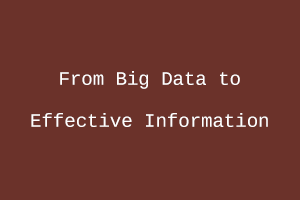In this ever-changing world, the use of the internet and electronic devices is increasing day by day. People create, communicate, and share information through the global internet. Organizations analyze this data to create new products, improve the efficiency and effectiveness of existing products, and better decision-making. The main concern now is how the organizations can gather, store and use this data. The constraints the organizations have to follow to analyze the data are the focus of concern. Big Data is an asset for key organizations and is very well managed. With the help of big data technologies, users can examine and analyze problems that are more complex and can be solved with greater difficulty than ever before. Following are some security of the security concerns that should be kept in mind:
- The framework incorporated for the creation, storage, and analysis of data needs to be secured.
- The data is now cloud-based and security controls imposed improperly can expose the data on the internet.
- Poor security practices are implemented in IoT devices and have limited capabilities to protect the data from cyber-attacks and other security breaches.
- The use of Cognitive Systems, MLS, and AI needs training data, which adds more security and compliance risks.
Security thefts can affect big data either in online or offline mode. It also affects the data on the cloud. Attacks on big data systems may be DDoS attacks, information theft, or other malicious activities. Some of the big data security attacks are explained here:
-
Distributed Data:
Data processing tasks are distributed among many systems. Big data do it to make the processing fast. For example, Hadoop architecture is designed to process data among distributed systems without keeping in mind security issues. It is open-source. Cybercriminals can easily attack the data by forcing the MapReduce mapper to show wrong lists of values or key pairs.
-
Non-Relational database:
Relational databases cannot handle Big data because of their diverse structure. NoSQL databases (Non-Relational Databases) are used as an alternative to relational databases. NoSQL databases provide good performance with highly scalable data but with a drawback of security threats. So the organizations using NoSQL databases with Big data have to set up the database in a trusted environment with more security measures.
-
Endpoint susceptibility:
Cybercriminals counterfeit the data on the endpoint devices and transmit the wrong data to the data lakes. Fraud detection technologies analyze the logs from the endpoints to ratify the authenticity of data.
-
Data Mining Solutions:
Data mining tools is the most important part of Big data as it deals with personal and financial information of any organization. It finds patterns in the unstructured data to retrieve useful information. So an extra layer of protection should be provided to protect the data from internal and external threats.
-
Access Controls:
Big data technologies are not architectured to provide granular access control means it is not meant to provide different levels of access to different users of the system. One solution for this is to create a separate big data data warehouse. By providing an adequate access control strategy with data authentication, big data systems can be protected from security threats like phishing attacks and social engineering attacks.
Security tools for protecting the data from unauthorized access are not new but now they are more scalable. Some of the tools used to protect Big data from unauthorized access are:
-
Encryption:
Big data tools provide security to the data at rest and also to the data in use. Big data deals with large volume sets and with multiple data storage formats like Hadoop or NoSQL databases so encryption should be provided on each data storage format.
-
Intrusion Detection and Prevention:
In big data systems data flow over the network. So Intrusion detection systems could detect the vulnerability exploits to the network. IDS uses various algorithms to protect the bid data systems from network threats like Linear Discriminant Analysis (LDA), Canonical Correlation Analysis (CCA), etc.
-
User Access Control:
Big data experts apply a number of data access controls on a large volume of data. Organizations have to apply access controls to protect the data from unauthorized access. For Example, the Hadoop file system works on distributed data and provides a MapReduce framework.
-
Centralized key management:
Organizations deploy a number of cryptographic methods on data to protect it from misuse. It involves protecting the encryption keys from misuse. The benefits of centralized key management are:
- Unified key management.
- A single point of protection.
- Single point for recovery.
- Key mobility.
- Consolidated audit information.
Study Section provides a big list of certification exams through its online platform. The French Certification exam can help you to certify your skills to communicate in the French language. Whether you are new to the language or you are an expert in it, this French certification exam can test the ability of anybody’s command over the French language.




